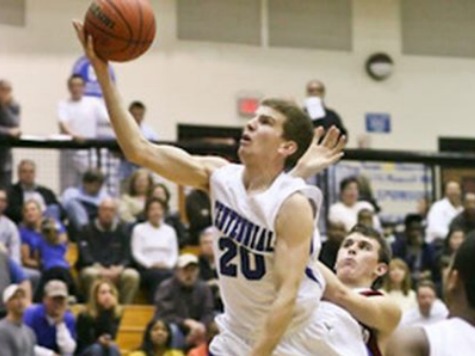A freshman Colgate basketball player is appealing the NCAA’s decision to take away one year of eligibility from him because he had played three games in a recreational church league.
As reported in the Atlanta Journal-Constitution, freshman basketball player Nathan Harries graduated from high school in 2011, but “delayed college for two years to serve a religious mission in North Carolina.”
The NCAA ruled that “Harries played this past summer in an organized and competitive basketball league before enrolling at Colgate” and informed him that he would be ineligible for this season.
According to the Journal-Constitution, “in late July, just a few weeks before Harries planned to head to the Colgate campus in upstate New York, the NCAA emailed him a standard questionnaire, asking if he played any organized sports over the past two years. Harries didn’t think much of it. He responded yes.”
A week later, the NCAA sent back a notice declaring him ineligible.
The NCAA denied Colgate’s request for a waiver and Colgate filed an appeal.
Harries reportedly was “just a fill-in for three games for a ‘C’ level team in a relative church basketball league. Most players are in their 30s; one team is largely comprised of players in their 50s.”
Matt Adams, a 36-year-old high school teacher and player in the league, told the Journal-Constitution, “We had one guy who played with us and he was like, ‘If any of you have any advice you could give me that would be great because I never played basketball before.'” Adams is the family friend who contacted “Harries in mid-July because some players on his team couldn’t make the team’s next game and his roster was down to four players. Harries, hoping to get back in playing shape, jumped at the chance for a full-court game. He played three games total — two on one night, one on another.”
The NCAA “mandates student-athletes who don’t enroll in college within a year of graduating high school may not compete in organized competition or risk losing a year of eligibility.”
Chris Radford, the NCAA’s associate director of public and media relations, reportedly said in a statement, “I can confirm that an initial staff decision was provided. Once the formal appeal is received, the NCAA Subcommittee for Legislative Relief will review the case and provide a final decision. The NCAA typically does not discuss specific waiver-request information prior to the completion of the appeal process.”
According to the Journal-Constitution, “one of the NCAA’s criteria for a competitive league is whether referees are used and players wear uniforms.” In the league in question, there are reportedly referees and uniforms, but “most teams don’t even have matching uniforms. When Harries played, he wore an old blue Centennial jersey with no number.”
Harries told the publication, “You know what’s crazy?” There’s one player on Colgate (Murphy Burnatowski) who plays for the Canadian (development) national team. So the NCAA says you can play in Europe against the U.S., Russia, Brazil, Australia, the Czech Republic and Sweden, but you can’t play in a church league. The whole thing is absurd.”
Harries may have a chance of getting his eligibility back. This year, college basketball color analyst Dick Vitale helped get a Rutgers transfer a waiver to play after the hardship waiver had initially been even though the player had transferred to the school after the death of a parent. In addition, after the NCAA initially banned a former Marine from playing football this year at Middle Tennessee State because he had played in a recreational league on a military base, the NCAA reversed course and allowed Steven Rhodes to play this season in addition to giving him back the years of eligibility the NCAA had originally taken away.
Photo credit: Atlanta Journal-Constitution

COMMENTS
Please let us know if you're having issues with commenting.